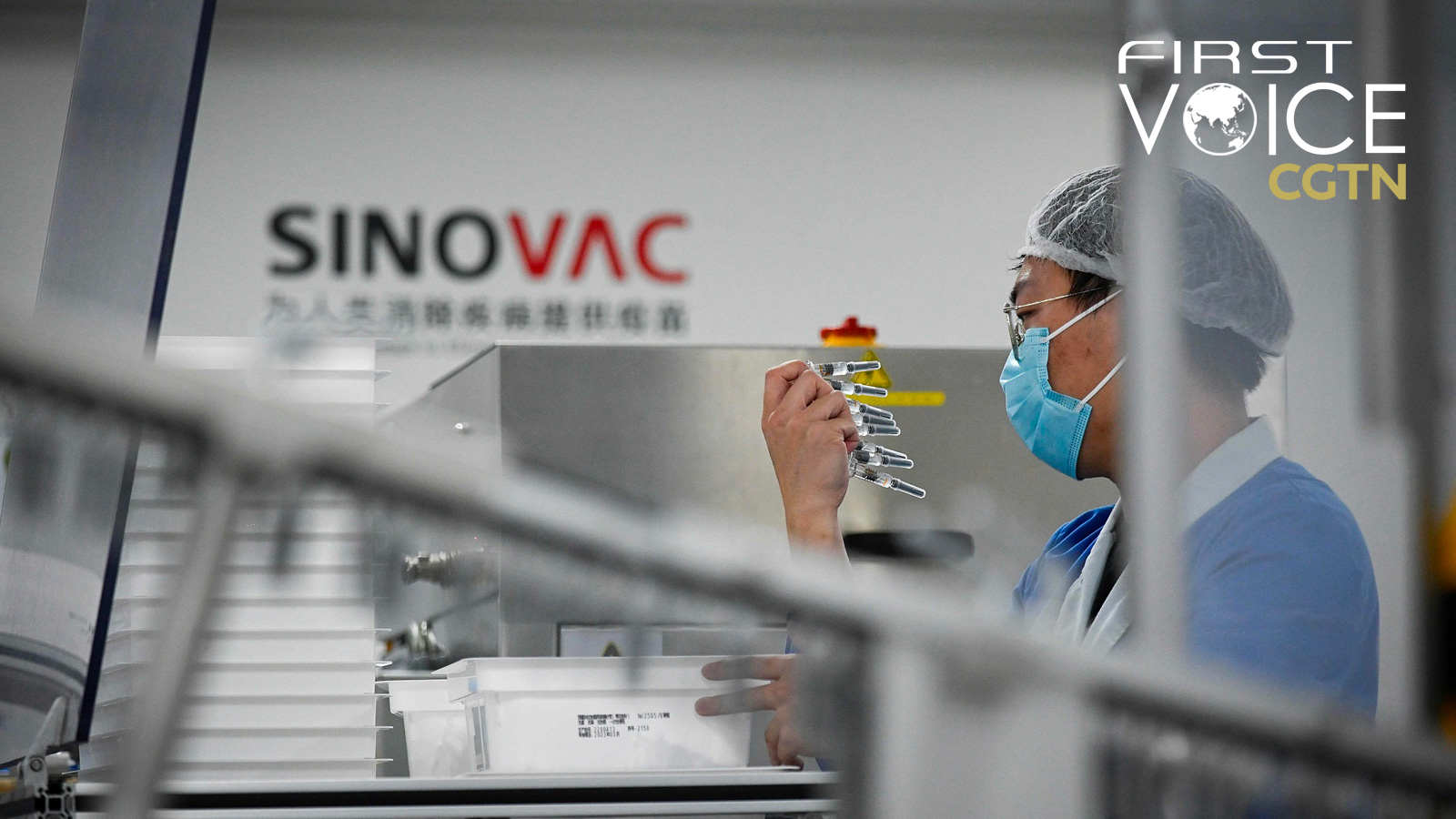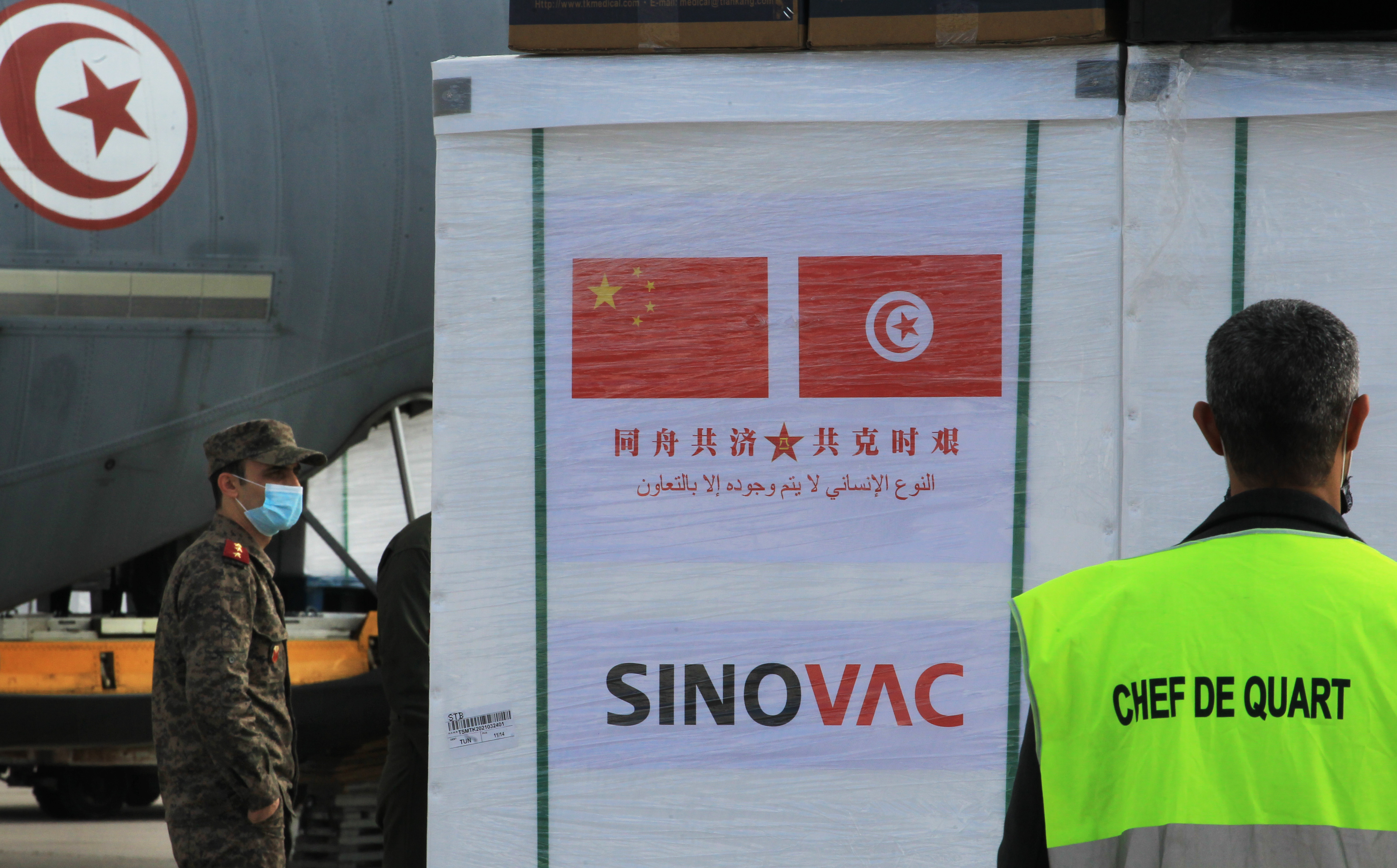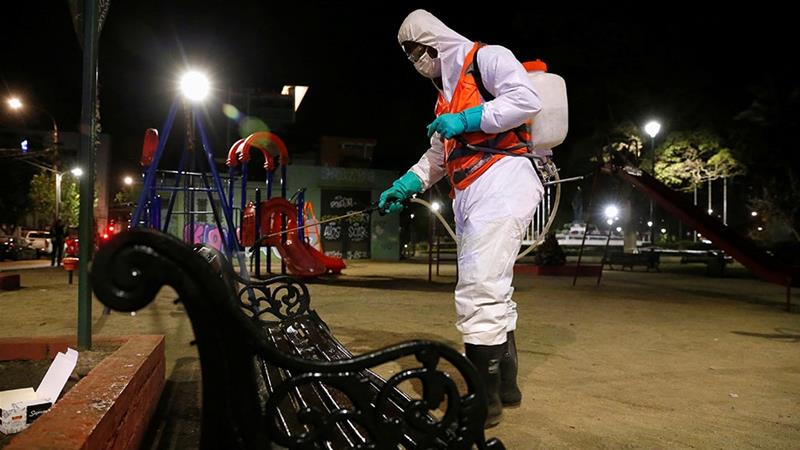
Editor's note: CGTN's First Voice provides instant commentary on breaking stories. The daily column clarifies emerging issues and better defines the news agenda, offering a Chinese perspective on the latest global events.
When the director of the Chinese Center for Disease Control and Prevention Gao Fu made a presentation concerning the country's vaccination drive, mainstream Western media universally claimed that he "admitted" that the "efficacy of China's vaccines was low." This quickly escalated into political attacks toward countries that had used China's vaccines in their rollouts, most predominantly Chile, which used Sinovac but is currently suffering from a new wave of the virus.
For a long time now, there has been a concerted push to deliberately discredit China's vaccines and spread misinformation about them. An April 7 article in Foreign Policy magazine straight up characterized China's vaccine export as "intends to repair some of the damage done to Beijing's reputation by the pandemic and to solidify its image as a generous donor and ally" and alleges that "China … has prioritized vaccine exports over domestic distribution." It conveniently ignored the fact that China is the second most-vaccinated country in the world. The latest account has China's already administered 164.47 million doses.
The goal is wholly political. An article published by the Japan Times on December 29, 2020, mixed China's COVID-19 management with sovereignty issues like Hong Kong and Xinjiang, saying China "sparred with the U.S., UK and Australia" because it is "bolstered by its virus success." There isn't a trade-off. Regardless of how the pandemic is managed, China would never budge on issues that are core to its national interest or concern its sovereignty and national security.
Interpreting it as a zero-sum geopolitical competition, Western media erroneously perceive the widespread popularity of China's vaccines as "threatening" and brand it as "vaccine diplomacy," building on a popular misconception about China as "pushing for influence."

A convoy received a new shipment of anti-COVID-19 vaccine containing 200,000 doses of the Sinovac vaccine provided by the People's Republic of China as a gift to the Republic of Tunisia, as part of the decades-long health cooperation between the two countries at Tunis Carthage International Airport, Tunis, Tunisia, March 25, 2021. /Getty
A convoy received a new shipment of anti-COVID-19 vaccine containing 200,000 doses of the Sinovac vaccine provided by the People's Republic of China as a gift to the Republic of Tunisia, as part of the decades-long health cooperation between the two countries at Tunis Carthage International Airport, Tunis, Tunisia, March 25, 2021. /Getty
This propaganda effort consistently ignores the fact that developing countries have been left with little options, as the wealthier countries have turned to oratory support instead of actual assistance. While the West has aggressively hoarded vaccines and battled each other over what has been dubbed "vaccine nationalism," the poorer countries have been left out. It's China that has been the primary source of help for the developing world.
While the COVID-19 crisis wages on, China is the only country in the world that fulfills all three necessary conditions to help fight the pandemic. It is internally stable and has contained the virus at home, whereas most of the world has not. It has the supply chain strength to manufacture vaccines on a scale greater than any other country, and it is able and willing to export vaccines to the rest of the world without putting itself at a disadvantage.
As the U.S. and its allies advocate a policy of "geopolitical competition," China's vaccine support has been viewed not as a "win-win" for the world but a zero-sum geopolitical struggle. The BBC, for one, only publishes negative stories related to Chinese vaccines while repeating its lavish compliments for India despite the country's catastrophic second wave and the ban on its Remdesivir's export.
This negative vaccine coverage mostly focuses on branding China's vaccines as unreliable. It builds on a longstanding prejudice in the West that "made in China" products are of poor quality and unfit for purpose. Although China has produced many different kinds of vaccines, with more are on the way, coverage is predominantly focused on Sinovac, a vaccine being used mostly in Latin America. The vaccine is frequently singled out because a study states it only has 50.7 percent efficacy. They've used the recent occurrence of another wave of infection in Chile to try to argue that its effectiveness is failing despite a comprehensive rollout.

Local workers clean the streets as a precautionary measure amid the COVID-19 outbreak in Vina del Mar, Chile. /Reuters
Local workers clean the streets as a precautionary measure amid the COVID-19 outbreak in Vina del Mar, Chile. /Reuters
This is all bad faith reporting. First of all, Sinovac's 83.5 percent efficacy in preventing symptomatic disease has been conveniently omitted. The 50.7 percent figure is for mild cases. In other words, those who've already been infected with the virus. If the same criteria were applied to other vaccines, such as Pfizer, the efficacy figure would also be reduced. No vaccine prevents infections entirely; that is not how they work.
If one follows Chile's death count, one notes it has not surged in tandem with new cases in the country. This shows that Sinovac has had an impact on protecting the most vulnerable in society. The United States had more than 70,000 cases on April 13, rising hospitalizations and more than 400 deaths despite a "comprehensive" vaccination rollout. Western media won't seriously argue that America's vaccinations aren't working, will they? So why do that to China?
The misinterpretation of Gao Fu's comments and the race to discredit China's vaccines is a blatant, bad faith propaganda effort. It is not motivated by a sincere concern for human well-being but by geopolitics. With India, the Quad's cherry-picked "alternative" to China, now facing absolute disaster, China remains the only stable and reliable country for most nations to create a road map out of the pandemic. China's vaccination effort should be praised, not derided out of spite.
Scriptwriter: Tom Fowdy
(If you want to contribute and have specific expertise, please contact us at opinions@cgtn.com.)

